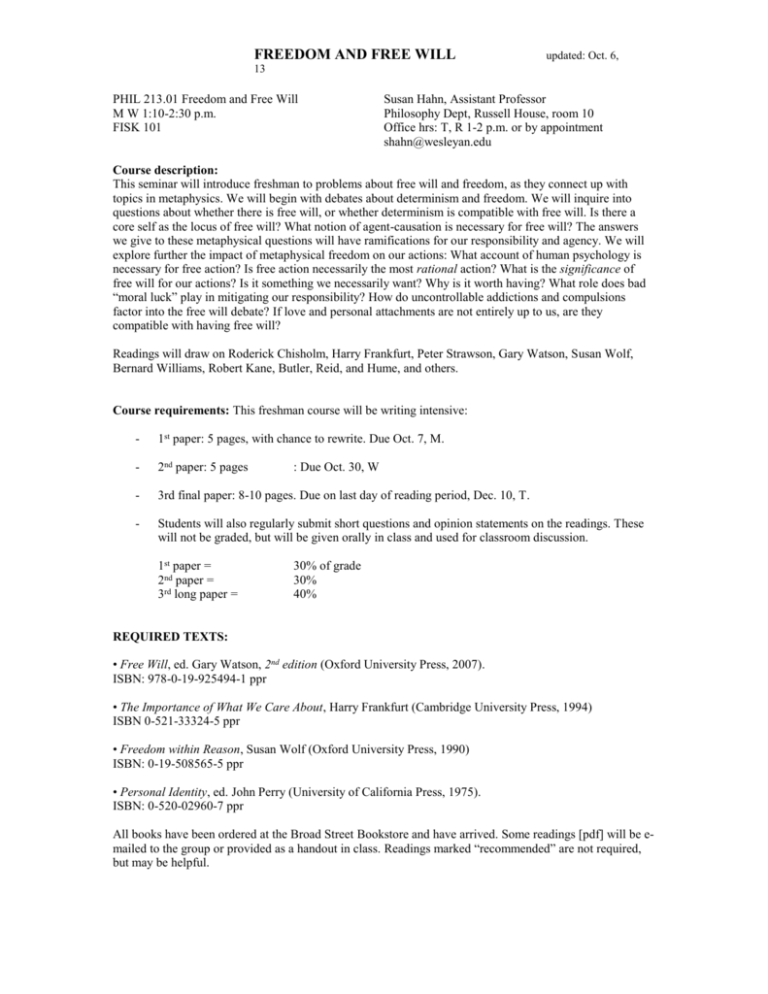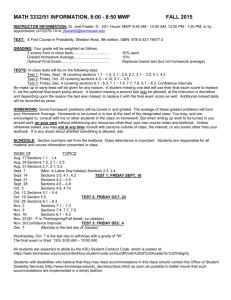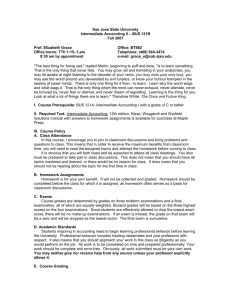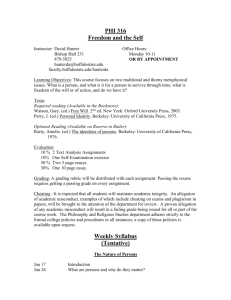Ethics Syllabus - WesFiles
advertisement

FREEDOM AND FREE WILL updated: Oct. 6, 13 PHIL 213.01 Freedom and Free Will M W 1:10-2:30 p.m. FISK 101 Susan Hahn, Assistant Professor Philosophy Dept, Russell House, room 10 Office hrs: T, R 1-2 p.m. or by appointment shahn@wesleyan.edu Course description: This seminar will introduce freshman to problems about free will and freedom, as they connect up with topics in metaphysics. We will begin with debates about determinism and freedom. We will inquire into questions about whether there is free will, or whether determinism is compatible with free will. Is there a core self as the locus of free will? What notion of agent-causation is necessary for free will? The answers we give to these metaphysical questions will have ramifications for our responsibility and agency. We will explore further the impact of metaphysical freedom on our actions: What account of human psychology is necessary for free action? Is free action necessarily the most rational action? What is the significance of free will for our actions? Is it something we necessarily want? Why is it worth having? What role does bad “moral luck” play in mitigating our responsibility? How do uncontrollable addictions and compulsions factor into the free will debate? If love and personal attachments are not entirely up to us, are they compatible with having free will? Readings will draw on Roderick Chisholm, Harry Frankfurt, Peter Strawson, Gary Watson, Susan Wolf, Bernard Williams, Robert Kane, Butler, Reid, and Hume, and others. Course requirements: This freshman course will be writing intensive: - 1st paper: 5 pages, with chance to rewrite. Due Oct. 7, M. - 2nd paper: 5 pages - 3rd final paper: 8-10 pages. Due on last day of reading period, Dec. 10, T. - Students will also regularly submit short questions and opinion statements on the readings. These will not be graded, but will be given orally in class and used for classroom discussion. 1st paper = 2nd paper = 3rd long paper = : Due Oct. 30, W 30% of grade 30% 40% REQUIRED TEXTS: • Free Will, ed. Gary Watson, 2nd edition (Oxford University Press, 2007). ISBN: 978-0-19-925494-1 ppr • The Importance of What We Care About, Harry Frankfurt (Cambridge University Press, 1994) ISBN 0-521-33324-5 ppr • Freedom within Reason, Susan Wolf (Oxford University Press, 1990) ISBN: 0-19-508565-5 ppr • Personal Identity, ed. John Perry (University of California Press, 1975). ISBN: 0-520-02960-7 ppr All books have been ordered at the Broad Street Bookstore and have arrived. Some readings [pdf] will be emailed to the group or provided as a handout in class. Readings marked “recommended” are not required, but may be helpful. 2 SCHEDULE OF READINGS DETERMINISM AND FREEDOM Sept. 2 M Introduction to course: Dilemma about Freedom Sept. 4 W Read: Roderick Chisholm: “Human Freedom and the Self” [in Watson anthology] Sept. 9, M Read: Frankfurt, “Freedom of the Will and the Concept of a Person” [Frankfurt]. Sept. 11, W Read: Gary Watson, “Free Agency” [Watson] Sept. 16 M Read: Frankfurt, “Identification and Externality” and “Identification and Wholeheartedness” [both in Frankfurt] Sept. 18, W Read: Frankfurt, “Alternate Possibilities and Moral Responsibility” [Frankfurt] Sept. 23 M Recommended, but not required: David Wideker, “Libertarianism and Frankfurt’s Attack on the Principle of Alternative Possibilities” [Watson] Recommended: John Martin Fischer, “Frankfurt-Style Compatibilism” [Watson] FREE WILL AND THE METAPHYSICS OF RESPONSIBILITY Sept. 25 W Read: Peter Strawson, “Freedom and Resentment” [Watson] Sept. 30 M Read: Susan Wolf, “Sanity and the Metaphysics of Responsibility” [Watson] Oct. 2 W True Self v. False Self Recommended: Susan Wolf, Freedom within Reason, Ch. 2 The Real Self View Oct. 7 M Are we free to be rational? Read: Wolf, Freedom within Reason, Chs. 3-4, The Autonomy View and Reason View First paper due Oct. 9 W Moral Luck: Read: Bernard Williams, “Moral Luck” [pdf] Recommended: Thomas Nagel “Moral Luck” [pdf] Oct. 14 M What is the Significance of Free Will? Read: Robert Kane, “Responsibility, Luck, and Chance: Reflections on Free Will and Determinism” [Watson]. Oct. 16, W Addictions and Compulsions Read: Jay Wallace, “Addiction as defect of the Will” [Watson] Oct. 18-22 Fall break PERSONAL IDENTITY AND THE SELF Oct. 23, W Introduction to problem of identity in general: Read: Locke, “Of Identity and Diversity” [Perry] 3 Oct. 28 M Locke on Identity of Persons (cont.) Oct. 30 W Ego Theory: Read: Reid, “Of Identity” [Perry] Read: Butler, “Of Personal Identity” [Perry] 2nd paper due Nov 4, M Hume’s notion of the Self Read: Hume, “Of Personal Identity” [Perry] Recommended: “Our Idea of Identity” [Perry] Nov 6, W The Linguistic Turn: Read: H. P. Grice, “Personal Identity” [Perry] Nov 11, M Read: Bernard Williams, “The Self and the Future” [Perry] AGENTS, CAUSES, AND FREE AGENCY Nov. 13, W Intro. to problem of causation and free agency Nov. 18 M Hume’s skeptical attack on Causation: Read: Hume, “The Idea of Necessary Connection” [pdf] Nov. 20, W Hume on causal efficacy and agency (continued) Nov. 25 M Read: Timothy O’Connor, “Agent Causation” [Watson] Thanksgiving break Nov. 27- Dec. 1, W – Sun. Dec. 2 M Nietzsche on cause and agency Read: Nietzsche, selections from Will to Power fragments: WP §488, 490, 46, 480, 481; BGE §21, 23, 36, 17-19; Daybreak: 129 [pdf] Dec. 4 W Nietzsche continued. Last class Dec. 7-10: Reading period: Final paper due on last day of reading period: Dec. 10, T. Writing website: “Guidelines for writing a philosophy paper”: <http://www.jimpryor.net/teaching/guidelines/writing.html> Plagiarism: Please familiarize yourself with Wesleyan’s policy on plagiarism in the student handbook: it will clarify what plagiarism is, the difference between word-for-word plagiarism and paraphrasing, etc. <http://www.wesleyan.edu/studentaffairs/studenthandbook/standardsregulations/plagiarism.html> Tutoring Resources For all freshman enrolled in Frosh seminars, the University offers writing tutors and writing resources. Disability Resources: We are asked to provide on the syllabus a statement about disability resources: “Wesleyan University is committed to ensuring that all qualified students with disabilities are afforded an equal opportunity to participate in and benefit from its programs and services. To receive accommodations, a student must have a documented disability as defined by Section 504 of the Rehabilitation Act of 1973 and the ADA Amendments Act of 2008, and provide documentation of the disability. Since accommodations may require early planning and generally are not provided retroactively, please contact Disability Resources as soon as possible. If you believe 4 that you need accommodations for a disability, please contact Dean Patey in Disability Resources, located in North College, Room 021, or call 860-685-2332 for an appointment to discuss your needs and the process for requesting accommodations.”








